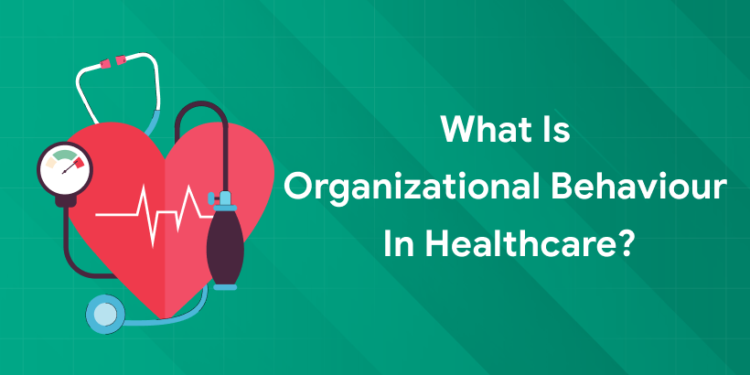Table of Contents
Key Takeaways:
- Organizational behaviour is essential for improving patient outcomes and staff satisfaction in healthcare.
- Effective leadership, communication, and teamwork are critical components.
- Employee motivation and engagement lead to better performance and reduced burnout.
- A positive organizational culture fosters a supportive and inclusive environment.
- Continuous performance management and quality improvement are vital for healthcare excellence.
Introduction
Imagine walking into a hospital where every staff member is on the same page, communication flows effortlessly, and patient care is seamless. Sounds like a dream? In reality, this is the magic of organizational behaviour in healthcare. Behind every successful hospital, clinic, or healthcare facility, there’s a carefully crafted system of human interactions, leadership, and teamwork that makes it all possible. But what exactly is organizational behaviour, and why does it matter so much in healthcare?
Healthcare isn’t just about medical expertise—it’s about people. From doctors and nurses to administrators and support staff, every individual plays a crucial role in shaping the patient experience. Organizational behaviour helps us understand how these individuals interact, how teams function, and how leadership can drive positive change. In this blog, we’ll break down the essentials of organizational behaviour in healthcare, answer your most pressing questions, and show you how mastering these concepts can transform healthcare delivery.
What Is Organizational Behaviour in Healthcare?
1: What is the primary role of a hospital administrator?
Organizational behaviour in healthcare refers to the study of how individuals, groups, and structures influence behavior within healthcare organizations. It combines psychology, sociology, and management principles to improve patient outcomes, staff satisfaction, and operational efficiency. This field examines everything from individual attitudes and group dynamics to leadership styles and organizational culture, all to create a more effective and supportive healthcare environment.
Organizational behaviour is not just about managing people; it’s about understanding the complex interplay between human behavior and organizational systems. In healthcare, this means recognizing how staff attitudes, communication styles, and leadership approaches directly impact patient safety, quality of care, and workplace morale.
People also read: The Difference Between General HR and Hospital HR Management
Hospital Administration Course with Assured Career Growth
Hospital Administration Course by Entri App: Master essential healthcare management skills, gain certification, and secure top roles in leading hospitals
Join Now!Why Is Organizational Behaviour Important in Healthcare?
Organizational behaviour is crucial because it directly impacts patient safety, staff well-being, and the overall quality of care. Effective organizational behaviour fosters a positive work environment, reduces burnout, and promotes ethical practices. By understanding and applying these principles, healthcare organizations can improve patient outcomes, enhance staff satisfaction, and drive operational excellence.
For example, hospitals with strong organizational cultures report higher staff retention rates, lower error rates, and better patient satisfaction scores. When healthcare professionals feel valued and supported, they are more likely to provide compassionate, high-quality care.
Also read: Hospital HR Executive Salary in Kerala
Key Components of Organizational Behaviour in Healthcare
Organizational behaviour in healthcare explores several key components:
- Individual Behavior and Attitudes: Personal attitudes and behaviors affect workplace performance and patient care. Understanding these factors helps managers address issues like motivation, stress, and job satisfaction.
- Group Dynamics and Team Interactions: Teamwork and collaboration are essential for effective patient outcomes. Effective group dynamics ensure that healthcare professionals work together seamlessly to provide the best possible care.
- Leadership and Management Styles: Different leadership styles (transformational, transactional, servant, democratic, situational) shape team performance. Effective leaders inspire teams, manage change, and adapt to industry challenges.
- Organizational Culture and Structure: Shared values, beliefs, and norms influence staff behavior and patient care. A positive organizational culture fosters a supportive and inclusive environment.
- Decision-Making Processes: Effective decision-making is vital for patient safety and operational efficiency. Data-driven insights and innovative approaches help healthcare organizations make informed decisions.
- Communication Patterns: Clear and open communication enhances patient safety and team effectiveness. Effective communication ensures that information is shared freely and that staff feel valued and included.
Leadership and Management in Healthcare Organizations
Leadership is critical in shaping organizational success and performance. Effective leaders inspire teams, manage change, and adapt to industry challenges. Management strategies in healthcare include implementing change management processes, fostering a supportive culture, and encouraging continuous improvement and innovation.
Leadership styles such as transformational leadership, which focuses on inspiring and motivating staff, and servant leadership, which prioritizes the needs of employees, are particularly effective in healthcare settings. These approaches help build trust, encourage collaboration, and drive positive change.
Also read: Hospital HR Executive Interview Questions and Answers
Hospital Administration Course with Assured Career Growth
Hospital Administration Course by Entri App: Master essential healthcare management skills, gain certification, and secure top roles in leading hospitals
Join Now!Communication and Teamwork
Clear communication is essential for patient safety, team collaboration, and effective care delivery. Healthcare organizations can improve teamwork by promoting open and honest communication, encouraging collaboration and mutual respect, and providing regular team-building activities.
Effective communication also involves active listening, providing constructive feedback, and ensuring that all team members feel heard and valued. When healthcare professionals communicate effectively, they can coordinate care more efficiently, reduce errors, and enhance patient satisfaction.
Also read: HR Management in Hospitals: Duties and Responsibilities
Employee Motivation and Engagement
Healthcare organizations can motivate employees by applying motivation theories (Maslow’s Hierarchy of Needs, Herzberg’s Two-Factor Theory), offering work-life balance and wellness programs, and recognizing and rewarding employee achievements. Engaged employees are more productive, provide better patient care, and are less likely to experience burnout.
Motivation theories suggest that employees are driven by both intrinsic factors (such as a sense of purpose and achievement) and extrinsic factors (such as recognition and rewards). By addressing both, healthcare organizations can create a motivating work environment that supports staff well-being and professional growth.
Organizational Culture in Healthcare
Organizational culture refers to the shared values, beliefs, and norms that shape the workplace environment. Healthcare organizations can create a positive culture by promoting safety, teamwork, open communication, and employee involvement. A supportive and inclusive environment fosters a sense of community and encourages staff to take ownership of their work.
A strong organizational culture has a powerful influence on improving employee contributions, enhancing self-confidence and commitment, reducing job stress, and improving ethical behavior. This, in turn, leads to better patient outcomes and overall quality of care.
People also read: Human Resource Manager in Hospitals: Specialised Role and Career Path
Performance Management and Quality Improvement
Performance management ensures that staff meet job expectations and continuously improve their skills. Quality improvement initiatives in healthcare include implementing SMART goals and healthcare OKRs, regularly reviewing and updating processes, and encouraging staff participation in quality improvement projects.
| Initiative | Description |
|---|---|
| SMART Goals | Specific, measurable, achievable, relevant, time-bound objectives |
| Healthcare OKRs | Objectives and Key Results focused on patient experience, clinical excellence, operational efficiency, staff well-being, and community health |
| Continuous Improvement | Regular review and update of processes to enhance quality and efficiency |
| Employee Involvement | Encouraging staff participation in quality improvement projects |
These initiatives help healthcare organizations optimize their services, deliver better outcomes for patients, and achieve their strategic objectives.
Challenges and Solutions in Healthcare OB
Healthcare organizations face numerous challenges related to organizational behaviour, including hierarchical structures, a diverse workforce, and high stress levels. Effective solutions include providing training and support for change management, fostering inclusivity and diversity, and implementing stress management and wellness programs.
For example, hierarchical structures can lead to communication lapses and reluctance to report errors. To address this, healthcare organizations can flatten management structures, encourage open communication, and create a culture of psychological safety where staff feel comfortable speaking up.
People also read: How Organizational Behaviour Affects Hospital Performance?
Entri’s Hospital Administration Course
Looking to master organizational behaviour and advance your career in healthcare? Entri’s Hospital Administration Course in Kerala is designed to equip you with the skills and knowledge needed to excel in hospital management. The course offers comprehensive training in healthcare management, finance, human resources, operations, and strategic planning. With 100% placement assistance, hands-on training, and flexible learning options, Entri ensures you are job-ready and confident in your career.
Conclusion
Organizational behaviour is the backbone of successful healthcare delivery. By understanding and applying its principles, healthcare organizations can create a positive work environment, improve patient outcomes, and foster a culture of excellence. Whether you’re a healthcare professional or aspiring administrator, mastering organizational behaviour is key to making a lasting impact in the healthcare industry.
Hospital Administration Course with Assured Career Growth
Hospital Administration Course by Entri App: Master essential healthcare management skills, gain certification, and secure top roles in leading hospitals
Join Now!Frequently Asked Questions
What is organizational behaviour in healthcare?
Organizational behaviour in healthcare is the study of how individuals, groups, and structures influence behavior within healthcare organizations. It focuses on improving communication, motivation, teamwork, and overall care quality by understanding human interactions and workplace dynamics.
Why is organizational behaviour important in healthcare?
Organizational behaviour is vital because it directly impacts patient safety, staff satisfaction, and the quality of care. Effective organizational behaviour helps create a positive work environment, reduces burnout, and promotes ethical practices, leading to better outcomes for both patients and staff.
What are the main components of organizational behaviour in healthcare?
The main components include individual behavior and attitudes, group dynamics and team interactions, leadership and management styles, organizational culture and structure, decision-making processes, and communication patterns. These elements work together to shape the workplace environment and influence patient care.
How does organizational behaviour affect patient outcomes?
Organizational behaviour affects patient outcomes by improving communication, reducing errors, enhancing teamwork, and fostering a culture of safety and accountability. When healthcare professionals work together effectively, patients receive higher quality care and experience better satisfaction.
What are common challenges in healthcare organizational behaviour?
Common challenges include hierarchical structures that can hinder communication, a diverse workforce that requires inclusive management, and high stress levels that can lead to burnout. Addressing these challenges involves fostering open communication, promoting inclusivity, and implementing stress management programs.
How can healthcare organizations improve their organizational culture?
Healthcare organizations can improve their culture by promoting safety, teamwork, open communication, and employee involvement. Encouraging staff participation in decision-making, recognizing achievements, and providing support for professional development are key strategies.
What role does leadership play in organizational behaviour?
Leadership plays a critical role by inspiring teams, managing change, and adapting to industry challenges. Effective leaders use various styles—such as transformational, transactional, and servant leadership—to motivate staff and drive positive change.
How can healthcare organizations motivate employees?
Organizations can motivate employees by applying motivation theories, offering work-life balance and wellness programs, and recognizing and rewarding achievements. Engaged employees are more productive and provide better patient care.
What are some quality improvement initiatives in healthcare?
Quality improvement initiatives include implementing SMART goals, healthcare OKRs, regular process reviews, and encouraging staff participation in improvement projects. These initiatives help optimize services and deliver better outcomes for patients.
How does organizational behaviour support patient-centered care?
Organizational behaviour supports patient-centered care by ensuring that staff prioritize patient safety, ethical behavior, and satisfaction. A strong organizational culture and effective communication are essential for delivering care that meets patient needs and expectations.















